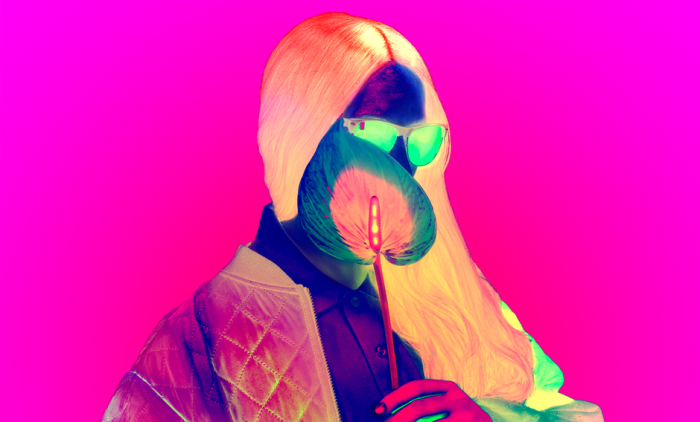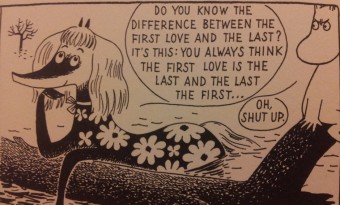It feels like feminism is closer to the forefront of cultural criticism right now than at any time since the advent of Riot Grrrl. Certainly it’s hard to remember a time when gender politics was discussed so frequently in relation to music. Is this down to a shifting calibration of society’s moral compass that’s been slowly taking place over the last few decades? Or is it because a significant number of Cultural Studies graduates have found that, unless they want to become Cultural Studies lecturers, their degree offers very few employment opportunities beyond becoming music journalists (hey, that’s how I ended up here anyway).
The fact that more music hacks on Twitter took time to mourn the passing of eminent cultural theorist Stuart Hall than Devo guitarist Bob Casale suggests it could be the latter. Then again, there were even more lamenting the loss of the bloke who played Trigger in Only Fools & Horses, so that’s probably a fairly meaningless extrapolation. Still, whatever the reason for it, the increasing scrutiny of music’s treatment of gender roles can only be a good thing.
It’s a shame, however, that there is so much that still needs to be scrutinised. The furore caused by Miley Cyrus’ performance at the VMAs last year for instance, was depressing not so much for the presence of appropriately named singing ringpiece Robin Thicke, or the confirmation that pop music is still hugely dependent on sleazy PR tactics (although both those factors were hugely depressing), but that Madonna basically produced an identically ‘shocking’ performance at the same awards ceremony in 1984. In thirty years, it seems, nothing has changed regarding pop music’s love of using nearly-naked women as its primary marketing tool. In fact, if anything, it’s more shameless than ever.
Moreover, when some pop stars try and comment on wider issues, everything gets even more confused. Recent attempts by Lily Allen and Beyoncé to position themselves as feminists drew plenty of criticism amid the plaudits, for ham-fistedly failing to consider intersectionality (Allen), or contributing to “a climate of women OUT-FANNYING each other to sell records” (Beyoncé). Read the responses to any random blog on either side of the argument, and you’ll likely witness several volleys of vitriol almost vehement enough to make you reconsider ever holding an opinion on anything ever again.
While these discussions are important, in such a heated environment it’s good to have unifying artists capable of reminding us that feminism should be an inclusive movement, one that you’d be a moron not to be a part of. Bolton-born, Berlin-based Planningtorock, aka Jam (née Janine) Rostron, may be the best we’ve got right now. Having played with gender identity since debut album ‘Have It All’ in 2006, using pitched-down vocals and facial prosthetics to blur aesthetic boundaries, new album ‘All Love’s Legal’ provides the biggest P2R statement to date.
With tracks like ‘Patriarchy Over & Out’, Let’s Talk About Gender Baby’ and ‘Misogyny Drop Dead’, the album’s message isn’t exactly subtle, but the simplicity of that message is actually one of its greatest strengths. After all, while there will always be repulsive nutters like those in the Taliban or on certain 4Chan message boards, what reasonable person wouldn’t want misogyny to drop dead? Moreover, who wouldn’t it to drop dead to the sound of booming bass and a bastardised techno beat? Clearly, only the most hard-of-hearing bigots.
Few of whom were in attendance at the gig in Brighton we reviewed last December, judging by a wild audience reaction that included stage invasions, stolen kisses, and regular screams of “we love you!”. The next day I met Rostron in a cosy flat in Hackney to discuss the growing anticipation surrounding All Love’s Legal (released this week). I felt like crap on the walk there owing to a persistent cold and some miserable weather, but luckily Rostron proved to be one of the warmest and most engaging subjects I’ve ever had the pleasure of interviewing, and the whole experience felt more like a friendly cup of tea and a chinwag than a professional obligation. We started by discussing the previous night’s party…
So, the crowd response last night was pretty amazing…
I know! I was like, what’s the catch here? Where are the cameras! No, they were a great crowd, there was a lot of openness in the room. It was a bit strange as we hadn’t really rehearsed the new stuff yet, but I really wanted to play ‘Human Drama’ and test it out. So it was really nice that the audience was really kind and open and loving.
You got a stage invasion as well!
Do you know what, ‘cos I wear sunglasses for a bit of privacy – somehow, even though you’re right in front of everybody – I couldn’t see they were onstage, and I was like, fucking hell! And then that woman came and was like, “I’m gonna kiss you”, and I whacked myself with the microphone. It was so fun. I felt a bit bad that they got pulled off by the security…
Well, at least they got up there…
Yeah, they didn’t give a shit! They were like, we’re mounting that stage! Totally…
So, what’s with the name change to Jam then?
I’ve been known as Jam in my private life for a long time. I kind of chose that name for myself and told everybody I wanted to be called that, and everybody just got into it. I wanted a name that wasn’t gender defined, that was the original motivation for it. And then there was just a point where it started to be too weird when people who didn’t know were referring to me as Janine, and I just thought it was the perfect time to incorporate it. So we just stuck it in the press release.
There are a couple of older tracks on All Love’s Legal, including ‘Misogyny Drop Dead’ (which originally came out in March 2013). The first time I heard that track it completely threw me, the rhythm and vocals are so off-kilter…
Yeah, yeah, totally. It’s funny because, not to get too muso-y, but it started with the bassline, and I just thought it was really funny because the timing of it’s slightly off – it’s kind of funky but it’s kind of wobbly as well. And then with those pan flutes, there was just this attitude. I really wanted to write something about misogyny and I thought, that’s a really interesting sonic environment to just plonk that message in there. And it all kind of worked together somehow. Even when I perform it I’m like, “I don’t know what this is!”. But that kind of feels right for it somehow, because I don’t wanna be preachy and I don’t wanna be resolute either. I want a certain openness. So in order to get that it’s kind of cool that the track has this sort of other potential, where you don’t quite know what it is. It’s kind of wobbling along there, you know? And that fitted.
Yeah, it actually sounded a lot more fluent last night. I don’t know why, maybe just because the bass was louder…
Keyboard. Hermione [Frank, P2R keyboardist] plays some key parts, because it’s a tricky one to perform because there’s no tune in it – once the pan flutes drop out it’s just bass and kick and a few snares. So vocally it’s really hard to be in tune as there’s nothing to place your tuning with, so we put some keyboard parts in there just to help me sing it in tune. Which sounds really crap but that’s just the way it is! And I think it actually glues it a bit, which is fine for live. But on the recording I quite like its elbows.
It’s quite nice having it in the middle of the album as well, just to disrupt everything a little bit…
Yeah, totally. It’s like, “Oh, we’re here! No, oh god, right, what’s this? OK, we’re going here…”, kind of thing.
It seems like feminism is nearer the top of the political agenda right now than it has been in years, especially in music. Is that part of the reason you wanted to make this album now? Or is it just a coincidence?
It’s so interesting, because my first album came out in 2006 and when I toured that record, if I used the words ‘feminism’ or ‘feminist’ in interviews, I got a lot of rejection or resistance. It was completely uncool and kind of taboo, which is really strange. And so cutting to now, where you can not only use the word but you can also then talk about how those ideas have to evolve, have to grow, as well as everything else that comes with it – thinking about not just feminism but transnational feminism, post-colonial feminism, intersectionality, everything, everything, everything – I think it’s mind-blowing. It’s really fucking exciting, because I definitely remember a time where I felt like you almost weren’t allowed to talk about it. It was like a really bad word to use.
What do you think would’ve been the reaction if you’d brought out this album back then?
That’s a good question actually. I don’t know. I think it would have had a hard time finding a place. And when you think about things feeding each other, there is a momentum definitely. I’ve never had that in my music-making, where something seems to be at the right time. I’ve never had that before, and it seems to be happening, and I’m like, that’s not what I do! It’s kind of funny, but on the other hand I’m really glad that if it does happen it’s happening because of this. It’s brilliant.
I definitely got the impression last night that people were engaging with the political message as well as the music…
Absolutely, they really wanted it. That’s another thing about the record – after having a sort of mini meltdown last year trying to work out what I wanted to do with music, or what music-making meant to me, I realised that I wanted to make something that was fucking useful. And also useful for me. So, last night, knowing people were really open and really wanted it as well, that was brilliant. I’ve made something that people want, but for more than just the music somehow.
The track ‘Let’s Talk About Gender’ is quite interesting to me as well. I remember hearing Salt-N-Pepa’s ‘Let’s Talk About Sex’ when I was a kid, and being shocked at hearing the word ‘sex’ in a pop song. Now everyone’s kind of anaesthetised to the idea of sex as entertainment, but if you bring gender into it, it’s still really contentious – just look at the Miley Cyrus thing, where everyone has such strong opinions on the meaning behind her career…
Yeah, and who’s exploiting who – is she being exploited, or is she exploiting herself? Together with, what’s the problem with a woman being sexual? But it’s very difficult with the mainstream because it’s all business, and it’s a very brutal business. It has an agenda which is not about politics in that sense, and definitely not interested in gender politics. It’s interesting also because mainstream pop definitely uses these things as fashionable tools, so you’ll have songs that visually use these things, but it’s not in their message or in their content. Yeah, it’s a tricky one. I heard that ‘let’s talk about gender’ lyric buried in the back end of The Knife’s ‘Full of Fire’. Which is an amazing track, but that lyric is fucking amazing! How funny is that? And how relaxed, how instant. It’s genius!
From your own lyrics on this album, it seems like you’re half aiming for gender equality, and half for gender extinction…
Yeah. I think it’s an interesting proposition, just imagining it, just thinking about it. I have very strong opinions about how everything that we do is genderised. I mean, it’s genderised for commodity reasons, but the damage that it does, in terms of intellect, skill, anybody’s ability to do anything, is also in some way genderised. And that is one of the biggest causes, I think, of gender discrimination. It messes everything up, and it’s bollocks. Ultimately, that individual shouldn’t be defined by any notion of gender, it’s definitely just conditioning. There’s just so much to kind of shed and unlearn, that kind of conditioning, the limits it imposes and the rules it has. It’s just a construct.
That’s one of the lyrics on ‘Human Drama’ isn’t it, “there’s so much to learn and so much to unlearn”. It’s almost less about learning new stuff than forgetting the stuff that’s been ingrained in you since you were a kid…
Yeah, because it’s really complex, from the minute you’re born, the kind of propaganda you’re exposed to. I’ve got a friend who’s got twin boys. They’re awesome, and since they were really small both of them have been into really bright colours, yellows, oranges and pinks and that. And I couldn’t believe it – it’s an absolute cliché, but the minute they got to school, that all stopped. All stopped. And it wasn’t just them or the other kids, it was also some of the teachers’ attitudes as well. And it’s kind of shocking, but if you just multiply that within a whole population, it’s like, OK, I can see why… And it’s so protected, these ideas are so held onto and territorial. It’s deep, very deep.
I guess as a parent you can do so much, but as soon as those kids are out in the wider world they’re subject to all these other influences…
Absolutely. It must actually be really bloody painful to see that process, trying to keep that kid’s confidence to somehow stand by their individual feelings and likes and stuff. It must be really fucking painful…
One of the ways that you sonically try and acheive gender ambiguity is with the pitched-down vocals. How do you try and replicate that live?
It’s a good question. How I do it in the studio – because I think it’s nice to be transparent about one’s process and not too territorial about it – I take the track and I pitch it up 2%. Then I’ll sing it high, deliberately high and completely not in my range, and it gives me this stress and tension in my voice. Then I pitch it all back down again and it gets this presence and this extra kind of attitude, and I really love it. I think you really hear it on ‘Misogyny Drop Dead’, and on ‘Human Drama’ as well, it’s quite deep. Live, it’s really interesting. I could potentially effect my voice live, and I’m still thinking about that, but I actually kind of like the dumb challenge to try and recreate it a third time, to recreate that production live somehow. And it doesn’t mess or interfere with me being able to enjoy myself with it either, it’s a very interesting challenge.
Is that why you don’t perform many of the songs from Have It All now?
Well, I will do for the next tour. I’ve kind of gone back to some of those tracks, and I worked out that ‘Don’t Want What You Don’t Want’ is pretty much my first feminist track, but I might give them a revamp or something. So yeah, it’s not the reason actually, it’s just because I’ve not played them for a while. Totally busted! I probably can’t remember the lyrics any more…
I listened to the new album on the train down to Brighton last night, and I thought it sounded so right for that sort of dark, slightly chilly train journey experience, especially ‘Answer Land’ for some reason. Is there an environment you envisage being the perfect place to experience your music?
I have to confess I do listen to the record myself quite a lot. I think every song has it’s own place a little bit, I tend to listen to different songs depending on my mood. The entire album? I’m not sure. I mean, I’m travelling a lot, and I love listening to music when I’m flying, but… I guess trains are pretty cool actually. ‘Public Love’ is a great track to drive to, fucking hell. You might have a crash, but yeah! Actually, my lawyer Vic says she cycles to that every morning to work. She says it makes her feel invincible! I can just imagine her with her nerdy bike helmet on, cycling down through West London to ‘Public Love’…
That could be dangerous…
To somebody else maybe!
Not a lot of musicians admit to listening to their own music that much, even though almost all of them blatantly do…
I know, I’m a bit like, should I say that? But I did make the album for myself as well, it’s also to remind me of certain things.
Yeah, you get so many people who say they “make an album for themselves and if anyone else likes it, it’s a bonus”, but then also claim not to listen to their own music once it’s finished. And it’s like, why did you make it then?
I know. I’m my number one fan!
So what’s your favourite of your own songs?
It’s hard to say, because I like them all for different reasons. I’m particularly fond of ‘Public Love’, but that’s more for production reasons which are really nerdy, because there are certain things I achieved with that having pushed myself in that direction that I’m really happy with. I tend to like them on different days as well. I really do like ‘Human Drama’, it’s one of the simplest and I wrote that in a day, really quick.
I don’t really have a number one. I guess I do really like ‘Patriarchy Over And Out’ and ‘Misogyny Drop Dead’, because of what I achieved in them. I’m pretty proud of them, because I’ve sort of created a situation where I can then stand on the stage and sing about that. Especially if you’re on tour and you experience some sort of gender discrimination with some of the crew or whatever, and then a few minutes later you’re singing ‘Misogyny Drop Dead’, and you’re like, “yeah, you listening to me mate?”. There it is, it’s functioning, and that’s really fun.
Have you had to content with quite a lot of that sort of thing?
Yeah, you do, you do. Definitely. Not all the time. I mean, in Brighton the crew were amazing, all genders, so sometimes it’s wonderful. But sometimes you’re just dumbfounded.
All your albums are quite distinguishable from each other, but also very obviously Planningtorock. They’re all really spacious as well, do you try to resist putting too many layers into your music, to keep it defined?
No, actually, that’s just a nice happy accident. It’s nice to hear that they all have their own strong identities. It’s funny actually, if I think about ‘Have It All’, ‘W’, and now ‘All Love’s Legal’, I feel like ‘All Love’s Legal’ definitely has elements of the last two. It definitely has something from ‘Have It All’, in that ‘Have It All’, for me, was quite punky in a way. I performed a lot and then made that record, so I kind of made it on the road.
‘All Love’s Legal’ has that a little bit – I didn’t want to be too precious with it. I didn’t let myself overindulge on the production and stuff, because I quite like this thing of just wanting to get it on the road, and that’s also how I make my living: touring. So there’s also the economic policy bit of it as well, which I’m happy to be transparent about as well – I’m not in the position to fart around for another six months on these songs! It’s done, let’s get it out. And ‘Have It All’ was quite like that, ‘cos I was just like: I love this, let’s get it out.
Pizzicato strings seem to recur a lot in your music…
Yeah, I think I’ll always have the pizzicato strings. I just love them, there’s something very emotional but also slightly comical about them. I love teetering between those two things. You could cry or you could absolutely laugh your arse off.
There’s a stronger dance influence on ‘All Love’s Legal’ too. What is it about dance music and culture that inspires you?
I think it’s such a great genre of music to take on something that’s maybe a little more intense lyrically, message-wise. I don’t know why, but after ‘W’ I started to get asked to DJ, and I’d never really done it. And so I taught myself how to DJ with Traktor and really got into it, and when you start Djing for 3 or 4 hours you start to really understand how dance music works. And it’s quite fucking phenomenal, you know? Also, as a cultural thing, anybody can go to a club. Anyone. And you can meet all kinds of people. And in a way, anyone can DJ, anyone can make music, you don’t have to have a degree, you don’t have to be going through some institute, you don’t need validating, you just can teach yourself.
And that’s pretty unique about music. I mean, of course, people try and impose hierarchies and value systems all the fucking time, but ultimately in music you can also still sort of escape that as well, that’s something very special about it, definitely in a club/dance environment. And I sometimes DJ stuff that has lyrics that are maybe a bit more intense or suggestive, and it just works. It’s a zone where you’re ready to take it on. Or you don’t have to either, it’s optional. But with ‘All Love’s Legal’ I really quite consciously wanted to make it a little bit dance anthem-y, and I wanted the lyrics to be super-simple so it’s just sticking in your ear. That’s all I wanted, it’s a pretty clear agenda.
What sort of stuff do you tend to play when you DJ?
Oh god. All kinds. Usually people are really surprised at how hard my set is, they’re like, bloody hell! At the moment I’m really getting into really early acid house. It’s like I’m sort of back to front, I’m like, “god, acid house is amazing!”, and everyone’s like, “er, yeah, where have you been?”. So I’m getting into really early stuff where the arrangements are very loose and you never know where the track’s going. And they’re so fucking funny! Some of the sounds in acid house are just hilarious, like super-farty and weird. So yeah, at the moment I’m acid house.
The first album seemed to have a general theme about leaving home, whereas the new one is obviously more about political and gender issues. What about ‘W’? That’s a bit harder to decipher…
‘W’ was a transition album, because when you make your first record you’ve got the wealth of all those years before you did it. You don’t really see it like that when you do it, but you’re putting a lot into it. And then for your second album, you don’t actually live that much! It’s literally like 16 or 17 months, and then apparently you’ve got to have the same wealth of lived experience and thought and feeling that you can put into that, and it doesn’t quite work.
I found the second album really bloody hard to do, which is not surprising. But I have a lot of love for ‘W’, because I learnt a lot making that record. And what I did learn was how to make this record! I mean, ‘The Breaks’ and ‘Doorway’, I love those songs and I love performing them and they still have absolute relevance, and I think calling it a transition record and it starting with ‘Doorway’ – there you go. It’s kind of funny when you look at them in retrospect, but I listen to tracks and I can totally see what I was trying to work out. So it was kind of a ‘working things out’ record, but I still think that’s interesting.
Because there was quite a big gap between the first and second albums…
Yeah, it was fucking hard work. It’s weird actually, you make something and you think, I’m gonna make the next one way better, and it’s a misconception because you can also erode a lot of things that were actually what made everything you did good. Like all the limitations, like not being too precious about things. And also this idea about making something better, what is that? I don’t know. So I went through all that muddled thought and then came out the other end like, I’m just gonna make another ‘Have It All’, but in a different time and with different ideas.
I found that album made so much more sense after seeing you play it live, it all really clicked for some reason.
Oh wow. Cool, that’s really nice to know.
I don’t know what the difference was. Maybe I’ve just got really rubbish speakers at home.
Ha! Fantastic.
You’ve done a lot of stuff with masks and prosthetics, what’s the idea behind that? Are the sunglasses your new way of ‘masking’ yourself?
With the prosthetics, that was just wanting to play around with the gender of the face. Change the brow, change certain things, and suddenly you’re not quite sure what the gender is. And a little bit playing around with the presence, because I’m seen as a certain gender in society, playing with that onstage and defining it, redefining it. It’s like an ongoing experiment.
For this record I just can’t be arsed really. I just want to turn up at a gig and get onstage, and it’s more about what I’m saying than how I’m looking. With the glasses, I can be quite shy and I’m not the kind of person who finds it easy to be recognised, I need that space for myself. And that’s the way I do it, because the eyes – you’re really lucky you can see my eyes! – are a big identifier. If you don’t really see the eyes it just protects me a little bit. Not that I’m a big-ass fucking celebrity but it’s amazing, you get some fans who are really, you know, intense. So I need that a little bit.
What sort of intense fan experiences have you had?
It’s just when fans get really into what you do, it’s an ownership thing. And then you’re responsible for things, and you’ll get fans who will be going crazy for you, and then they’re like, “Oh, but I’m really unhappy you didn’t play my favourite track on blah-de-blah day at so-and-so venue”, and you’re like, woah, OK, this is too much. And they’re really angry at you…
…as if you’ve done it to personally offend them…
But really, you know! And expectations are projected on you, and it can get quite scary. I don’t know how other artists feel about that, but I definitely need a bit of privacy.
I imagine that making it harder when you’re writing music as well, if you’ve got all these other outside ideas of what people want to hear from you…
Oh god yeah. I don’t mind people having ideas, but I’ve got another agenda. It’s a strange thing. I don’t know how these celebrities live, I’d be so terrified, I’d feel so vulnerable and so invaded. Because if you don’t have that privacy then you can never just be alone, and you need that, you need to be able to be alone with yourself.
Maybe certain personality types can deal with it. Or maybe that’s why so many celebrities go mad…
Absolutely.
When I was reviewing last night’s gig earlier today, it struck me that I couldn’t think of any other musicians I could easily compare you to. Is that something you think about much?
Not at all. It used to really upset me when people didn’t know how to describe my music, and now I fucking love it. It’s also that thing of never being hyped or pushed, and you’re thinking, why not? Now I’m like, thank fuck! I’m just happy doing my thing over here, and come and join or not, whatever. I just do what I find interesting.
Clearly an increasing number of people are finding what Rostron does interesting and coming over to join the Planningtorock party. And that’s the thing; for all that ‘All Love’s Legal’ might sound dry or didactic on paper, in reality it’s also a party, one that anyone with an open mind is invited to. It’s also one you’d be a fool, for several reasons, not to attend. Let’s not just talk about gender, let’s dance about it too.
Kier Wiater Carnihan






Follow us
Follow us on Facebook Follow us on Twitter Follow us on Google+ Subscribe our newsletter Add us to your feeds